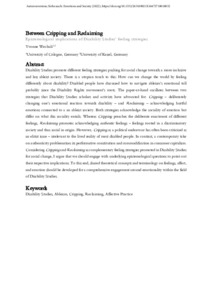Datum
2022Autor
Wechuli, YvonneSchlagwort
360 Soziale Probleme, Sozialarbeit Disability StudiesBehinderter MenschDiskriminierungInklusion <Soziologie>StrategieGefühlMetadata
Zur Langanzeige
Aufsatz
Between cripping and reclaiming

Between cripping and reclaiming
Epistemological implications of Disability Studies’ feeling strategies
Zusammenfassung
Disability Studies promote different feeling strategies pushing for social change towards a more inclusive and less ableist society. There is a utopian touch to this: How can we change the world by feeling differently about disability? Disabled people have discussed how to navigate ableism’s emotional toll probably since the Disability Rights movement’s roots. The paper-at-hand oscillates between two strategies that Disability Studies scholars and activists have advocated for: Cripping – deliberately changing one’s emotional reaction towards disability – and Reclaiming – acknowledging hurtful emotions connected to a an ableist society. Both strategies acknowledge the sociality of emotion but differ on what this sociality entails. Whereas Cripping preaches the deliberate enactment of different feelings, Reclaiming promotes acknowledging authentic feelings – feelings rooted in a discriminatory society and thus social in origin. However, Cripping as a political endeavour has often been criticised as an elitist issue – irrelevant to the lived reality of most disabled people. In contrast, a contemporary take on authenticity problematises its performative constitution and commodification in consumer capitalism. Considering Cripping and Reclaiming as complementary feeling strategies promoted in Disability Studies for social change, I argue that we should engage with underlying epistemological questions to point out their respective implications. To this end, shared theoretical concepts and terminology on feelings, affect, and emotion should be developed for a comprehensive engagement around emotionality within the field of Disability Studies.
Zitierform
In: Emotions and Society Vol. 4 / No. 2 (2022) eissn:2631-6900Zitieren
@article{doi:10.17170/kobra-202205066145,
author={Wechuli, Yvonne},
title={Between cripping and reclaiming},
journal={Emotions and Society},
year={2022}
}
0500 Oax
0501 Text $btxt$2rdacontent
0502 Computermedien $bc$2rdacarrier
1100 2022$n2022
1500 1/eng
2050 ##0##http://hdl.handle.net/123456789/13842
3000 Wechuli, Yvonne
4000 Between cripping and reclaiming / Wechuli, Yvonne
4030
4060 Online-Ressource
4085 ##0##=u http://nbn-resolving.de/http://hdl.handle.net/123456789/13842=x R
4204 \$dAufsatz
4170
5550 {{Disability Studies}}
5550 {{Behinderter Mensch}}
5550 {{Diskriminierung}}
5550 {{Inklusion <Soziologie>}}
5550 {{Strategie}}
5550 {{Gefühl}}
7136 ##0##http://hdl.handle.net/123456789/13842
<resource xsi:schemaLocation="http://datacite.org/schema/kernel-2.2 http://schema.datacite.org/meta/kernel-2.2/metadata.xsd"> 2022-05-17T16:36:28Z 2022 doi:10.17170/kobra-202205066145 http://hdl.handle.net/123456789/13842 eng Urheberrechtlich geschützt https://rightsstatements.org/page/InC/1.0/ Disability Studies ableism cripping reclaiming affective practice 360 Between cripping and reclaiming Aufsatz Disability Studies promote different feeling strategies pushing for social change towards a more inclusive and less ableist society. There is a utopian touch to this: How can we change the world by feeling differently about disability? Disabled people have discussed how to navigate ableism’s emotional toll probably since the Disability Rights movement’s roots. The paper-at-hand oscillates between two strategies that Disability Studies scholars and activists have advocated for: Cripping – deliberately changing one’s emotional reaction towards disability – and Reclaiming – acknowledging hurtful emotions connected to a an ableist society. Both strategies acknowledge the sociality of emotion but differ on what this sociality entails. Whereas Cripping preaches the deliberate enactment of different feelings, Reclaiming promotes acknowledging authentic feelings – feelings rooted in a discriminatory society and thus social in origin. However, Cripping as a political endeavour has often been criticised as an elitist issue – irrelevant to the lived reality of most disabled people. In contrast, a contemporary take on authenticity problematises its performative constitution and commodification in consumer capitalism. Considering Cripping and Reclaiming as complementary feeling strategies promoted in Disability Studies for social change, I argue that we should engage with underlying epistemological questions to point out their respective implications. To this end, shared theoretical concepts and terminology on feelings, affect, and emotion should be developed for a comprehensive engagement around emotionality within the field of Disability Studies. open access Wechuli, Yvonne doi:10.1332/263169021X16472718018032 Disability Studies Behinderter Mensch Diskriminierung Inklusion <Soziologie> Strategie Gefühl Epistemological implications of Disability Studies’ feeling strategies acceptedVersion eissn:2631-6900 No. 2 Emotions and Society Vol. 4 2023-04-25 2023-04-25 false </resource>
Die folgenden Lizenzbestimmungen sind mit dieser Ressource verbunden:
Urheberrechtlich geschützt

